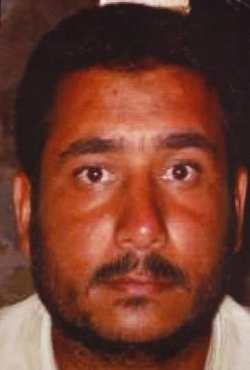 By the time he was captured last month, the man known among Iraqi insurgents as "the Tiger" had lost much of his bite. Abu Uthman, whose fierce attacks against U.S. troops and Iraqi civilians in Fallujah had earned him a top spot on Iraq's most-wanted list, had been reduced to shuttling between hideouts in a Baghdad slum, hiding by day for fear neighbors might recognize him.
By the time he was captured last month, the man known among Iraqi insurgents as "the Tiger" had lost much of his bite. Abu Uthman, whose fierce attacks against U.S. troops and Iraqi civilians in Fallujah had earned him a top spot on Iraq's most-wanted list, had been reduced to shuttling between hideouts in a Baghdad slum, hiding by day for fear neighbors might recognize him. In the end, a former associate-turned-informant showed local authorities the house where Uthman was sleeping. On Aug. 11, U.S. troops kicked in the door and handcuffed him. They quietly ended the career of a man Pentagon officials describe as the kidnapper of American journalist Jill Carroll and also as one of a dwindling number of veteran commanders of the Sunni insurgent group known as al-Qaeda in Iraq (AQI).
Uthman, whose given name is Salim Abdallah Ashur al-Shujayri, was one of the bigger fish to be landed recently in a novel anti-insurgent operation that plays out nightly in Baghdad and throughout much of Iraq. U.S. intelligence and defense officials credit the operation and its unusual tactics -- involving small, hybrid teams of special forces and intelligence officers -- with the capture of hundreds of suspected terrorists and their supporters in recent months.
The "fusion cells" are being described as a major factor behind the declining violence in Iraq in recent months. Defense officials say they have been particularly effective against AQI, which has lost 10 senior commanders since June in Baghdad alone, including Uthman.
Aiding the U.S. effort, the officials say, is the increasing antipathy toward AQI among many ordinary Iraqis, who quickly report new terrorist safe houses as soon as they're established. Fresh tips are channeled to fast-reaction teams that move aggressively against reported terrorist targets -- often multiple times in a single night.
"Wherever they go, they cannot hide," said a senior U.S. defense official familiar with counterterrorism operations in Iraq. "They don't have safe houses anymore."
The rapid strikes are coordinated by the Joint Task Force, a military-led team that includes intelligence and forensic professionals, political analysts, mapping experts, computer specialists piloting unmanned aircraft, and Special Operations troops. After decades of agency rivalries that have undermined coordination on counterterrorism, the task force is enjoying new success in Iraq with its blending of diverse military and intelligence assets to speed up counterterrorism missions.
Joint Chiefs of Staff Chairman Adm. Michael Mullen said in a recent interview that the cells produce intelligence that nets 10 to 20 captures a night in Iraq.
"We're living in a world now where targets are fleeting," Mullen said. "I don't care if they're on the ground, in the air, on the sea or under the sea -- you don't get much of a shot, and you've got to be able to move quickly."
Fusion cell teams have helped collect and analyze intelligence not only against AQI and Sunni insurgents but also against Shiite militias and foreign fighters, say U.S. military officials.
Headquartered in an old concrete hangar on the Balad Air Base, which once housed Saddam Hussein's fighter aircraft, about 45 miles north of Baghdad, the Joint Task Force in Iraq runs fusion cells in the north, west and south and in Baghdad, U.S. officials said.
The headquarters bustles like the New York Stock Exchange, with long-haired computer experts working alongside wizened intelligence agents and crisply clad military officers, say officials who have worked there or visited.
Huge computer screens hang from the ceiling, displaying aerial surveillance images relayed from Predator, Schweizer and tiny Gnat spycraft. The Bush administration's 2009 supplementary budget request included $1.3 billion to fund 28 unmanned aircraft, officials said, and all will go to the interagency teams in Iraq and Afghanistan, not the Air Force.
For the Joint Task Force, the CIA provides intelligence analysts and spycraft with sensors and cameras that can track targets, vehicles or equipment for up to 14 hours. FBI forensic experts dissect data, from cellphone information to the "pocket litter" found on extremists. Treasury officials track funds flowing among extremists and from governments. National Security Agency staffers intercept conversations or computer data, and members of the National Geospatial-Intelligence Agency use high-tech equipment to pinpoint where suspected extremists are using phones or computers.
Fusion cells remain one of the least-known aspects of U.S. operations in Iraq, U.S. officials said, but they have produced significant captures. In March, a fusion cell team captured Hajji Mohammed Shibl, whom U.S. authorities had linked to a string of gruesome attacks on U.S. and Iraqi forces. His Shiite militia group has ties to Iran's Revolutionary Guard Corps and Lebanon's Hezbollah.
"The capabilities for high-end special joint operations that exist now only existed in Hollywood in 2001," said David Kilcullen, a terrorism expert and adviser to Secretary of State Condoleezza Rice.
Data gathered in a raid at midnight -- collected by helmet-mounted cameras that can scan rooms, people, documents and cellphone entries and relay the pictures back to headquarters -- often lead to a second or third raid before dawn, according to U.S. officials.
"To me, it's not just war-fighting now but in the future," Mullen said. "It's been the synergy, it's been the integration that has had such an impact."
Defense officials said Uthman's capture reflected the success of the program and also sent a powerful message to remaining AQI members, who are now surrounded by foes even in regions once regarded as friendly. While AQI remains capable of staging deadly suicide bombings, its leaders are becoming reviled throughout the country and are hard-pressed to find sanctuary anywhere in Iraq, according to U.S. defense and intelligence officials.
The progress has somewhat eased concerns among military analysts about an al-Qaeda resurgence in Iraq after U.S. combat troops draw down, Pentagon and intelligence sources said.
The shift also is tacitly acknowledged inside al-Qaeda's base on the Afghan-Pakistan border, as Osama bin Laden has begun retooling his propaganda campaign to emphasize the conflict in Afghanistan instead of the failing effort in Iraq, the officials said. While there is little evidence that al-Qaeda is attempting to move fighters and resources from Iraq to Afghanistan, the Iraq conflict is no longer driving recruitment and donations for al-Qaeda as it did as recently as nine months ago, they said.
Attacks inside Iraq by AQI, meanwhile, have dropped sharply, with 28 incidents and 125 civilian deaths reported in the first six months of this year, compared with 300 bombings and more than 1,500 deaths in 2007.
"Iraq will always be a target that resonates for al-Qaeda, but we believe it will never again be the central front," said a U.S. counterterrorism analyst who was not authorized to speak on the record. "Their ability to affect what is going on in Iraq has been greatly diminished."
AQI's decline can be traced to several factors, the officials said. Last year's troop increase helped stabilize Baghdad and other major cities, freeing combat forces to take on AQI strongholds throughout the country.
Even before the "surge," the much-celebrated Anbar Awakening movement signaled a rift between tribal leaders of Iraq's Sunni minority and AQI. Since 2006, defense officials have described a deepening revolt by Sunnis repelled by al-Qaeda's brutal attacks against civilians and forced imposition of sharia, or Islamic law. Sunni leaders also objected to AQI's takeover of smuggling routes and black-market enterprises long controlled by local chiefs.
"We don't see the Sunni community going back to al-Qaeda under any circumstances," the senior defense official said.

 Senior
Senior 

 (Xinhua) -- The U.S.-led coalition forces have arrested four Iraqis suspected of abducting a U.S. female journalist who was kidnapped earlier in the year and then released, a U.S. military spokesman said Wednesday. "Coalition forces have detained four Iraqi men that we believe have been involved in the kidnapping of
(Xinhua) -- The U.S.-led coalition forces have arrested four Iraqis suspected of abducting a U.S. female journalist who was kidnapped earlier in the year and then released, a U.S. military spokesman said Wednesday. "Coalition forces have detained four Iraqi men that we believe have been involved in the kidnapping of 
 An Iraqi businessman linked to Saddam Hussein told a US television network the kidnapping of US journalist
An Iraqi businessman linked to Saddam Hussein told a US television network the kidnapping of US journalist